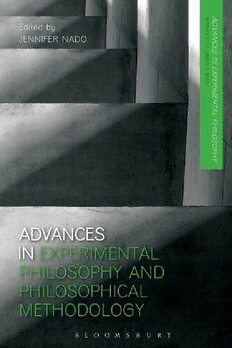
Advances in Experimental Philosophy and Philosophical Methodology PDF
190 Pages·2016·2.451 MB·English
Most books are stored in the elastic cloud where traffic is expensive. For this reason, we have a limit on daily download.
Preview Advances in Experimental Philosophy and Philosophical Methodology
Description:
The rise of experimental philosophy is generating pressing methodological questions for philosophers. Can findings from experimental studies hold any significance for philosophy as a discipline? Can philosophical theorizing be improved through consideration of such studies? Do these studies threaten traditional philosophical methodology?Advances in Experimental Philosophy and Philosophical Methodology addresses these questions, presenting a variety of views on the potential roles experimental philosophy might play in philosophical debate. Featuring contributors from experimental philosophy, as well as those who have expressed criticism of the experimental philosophy movement, this volume reflects on the nature of philosophy itself: its goals, its methods, and its possible future evolution.Tackling two major themes, contributors discuss the recent controversy over the degree to which intuition plays a major role in philosophical methodology and the characterization of the role of the experimental philosophy project. They also look at the relationship between so-called ‘positive’ and ‘negative’ projects and examine possible links between experimental and mainstream philosophical problems. Close discussion of these themes contributes to the overall goal of the volume: an investigation into the current significance and possible future applications of experimental work in philosophy.
See more
The list of books you might like
Most books are stored in the elastic cloud where traffic is expensive. For this reason, we have a limit on daily download.
